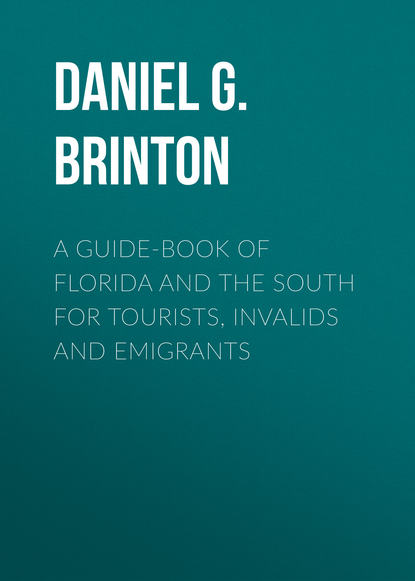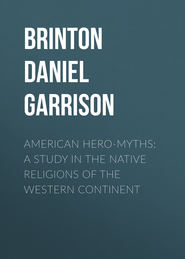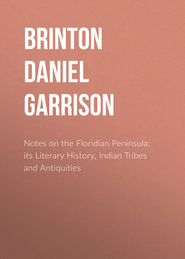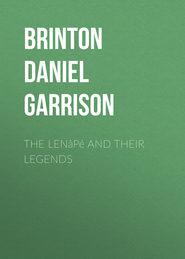По всем вопросам обращайтесь на: info@litportal.ru
(©) 2003-2024.
✖
A Guide-Book of Florida and the South for Tourists, Invalids and Emigrants
Настройки чтения
Размер шрифта
Высота строк
Поля
The sea coast of south-east Florida, therefore, fulfils the four conditions which make up the best climate for a consumptive. I have other testimony about it well worth presenting. It, too, comes from the same unimpeachable source, – the medical statistics of the United States Army. I preface it by a fact of general interest about the whole of Florida. All know how terribly arduous must be campaigning through the swamps and everglades of that State. Yet the yearly mortality from disease of the regular army there, was only twenty-six per thousand men. The average of the army elsewhere was thirty-five per thousand, while in Texas it rose to forty, and on the lower Mississippi to forty-four per thousand.
But the character of disease interests us most just now. We are inquiring particularly about throat and lung complaints. These army statistics are here of immense value. They specify the diseases of each station. I have taken these four: Consumption (phthisis pulmonalis), bronchitis, inflammation of the lungs (pneumonia), and pleurisy; and have ascertained their relative frequency at various points in the South. Here are the results (omitting fractions): In Arkanzas, each year, one man in every sixteen came under the surgeon’s hands, with one or other of these diseases; on the southern frontier of Texas, also one in sixteen; at Baton Rouge, La., one in seventeen; on the western frontier of Texas, one in nineteen; on the west coast of Florida, one in twenty-one; on the east coast of Florida, one in thirty-nine!
This is confirmation strong indeed. Even in the favored northwest, we may look in vain for anything equal to it. The sick reports of St. Paul, Minn., show one in every nineteen, yearly treated for these complaints.
Yet all this avails nothing, so long as there are no accommodations for invalids, in this favored region, none of the conveniences of civilized life, few inhabitants of any kind, hardly any means of getting there. There are bluffs forty feet high and more, on Indian river, beautiful localities along Key Biscayne Bay, in a glorious climate, healthy beyond any in our country, very easy of access from Key West, near the best hunting grounds of Florida, where an abundance of the most delicious tropical fruits could be raised, where fish, sea turtles and oysters abound; all that is needed is a weekly steamer from Key West, and a few plain, well kept, moderate priced hotels, to make it the most eligible spot in the South for the invalid or the tourist.
It has other attractions. I have been told that it is the only part of Florida where the pine apple will grow in the open air. Certainly guavas, pomegranates, dates, alligator pears, (that fruit which it is worth a voyage to the tropics to taste,) sugar apples and most of the other appetizing luxuries of the torrid zone would flourish.
The climate in winter is serene, from two-and-a-half to three inches of rain falling per month. The mean daily marking of the thermometer from November to April is 72°, of the hygrometer 68°. Here is another hint. The arrow root (maranta arundinacea) grows along Key Biscayne in great abundance. It furnishes the very finest form of starch known, a most admirable article of diet for the sick, and a most profitable one to the cultivator. Its wholesale price in our markets is from fifty to seventy-five cents per pound; there is always a demand for it, and tens of thousands of pounds a year could be readily gathered.
I have already detailed at some length the position, soil, etc., of Key Biscayne Bay (ante p. 102). But, as already said, I build for the future, and not the present. It has the best warm climate in the United States for invalids, and it deserves to become a much frequented spot.
CHAP. IV. – SOME HINTS TO HEALTH SEEKERS
In the introductory remarks I have thrown out a number of suggestions which every traveler in the South will do well to heed. I am now going to servir un plat de mon metier– to offer some admonitions to invalids distinctively, and especially those suffering or threatened with pulmonary and bronchial affections. How often does one see invalids abroad deluding themselves with the idea that the climate alone will cure them! Vain hope. Better remain at home and die, if need be, than undertake long and fatiguing journeys with any such expectation. The result in either case is the same.
There are certain rules of personal hygiene and diet which are half the battle, which might win it at home, which will almost surely win it if the right change of climate is made in time. They are not applicable to all, but they must form the basis of every regimen.
And here, once more, I repeat the watchword, Courage. If improvement is not manifest at once, do not become disheartened. Often it is months, often it is not until after the return home that the hoped for change for the better is obvious. The interim is at best wearisome. Make it as cheerful as possible. Valetudinarians should not travel alone. They fall easy victims to Giant Despair, who is still as ready as ever to pounce on unwary travelers, especially on wet days, alone in dull country taverns, with nothing to think of but themselves and their own aches and pains. Go in company and always have a resource for spare hours.
No resource is better than to collect something. There are bugs, and butterflies, and mosses, and fossils, and flowers, and Indian curiosities, and species of woods, and birds’ eggs, and skins, and minerals, the pursuit of either one of which will give healthful exercise in fair weather, and their arrangement interesting occupation when it rains.
I am almost pleased, for the invalid’s sake, to say that as for treasures of art, Florida has none. There are no interminable picture galleries, or cold, damp churches, or belvideres, or other such æsthetic afflictions to visit, the frequency of which in Italy is a serious drawback to the seeker after health. On the other hand, Nature has spread out boundless attractions in the animal, the vegetable, and the mineral worlds, the study of which has ever something soothing and rejuvenating.
Exercise in the open air every day should be taken religiously and regularly. The kind of exercise must depend on circumstances. Rowing develops the chest and arms; walking, the lower limbs; riding is an excellent stimulant of the liver and lungs. When possible, they should be alternated. An hour each morning and afternoon should be consecrated to this purpose. A cheerful companion is an admirable adjunct in any of them.
There is another exercise of the greatest value. No person with a weak chest should neglect to practice every morning and evening, for ten or fifteen minutes at a time, deep inspirations. It is done thus: Stand or sit erect, throw the chest well forward, the arms back, then open the mouth and inhale slowly to the full capacity of the lungs. Retain the air several seconds by an increased effort, and then let it gradually escape. Breathe naturally a few times, then repeat the inspiration. This simple procedure has a wonderful influence. It increases the breathing power of the lungs, it expands the walls of the chest, in the opinion of some learned physicians, Professor Piorry of Paris for example, it is actually curative where tuberculous deposit has already taken place. But whenever else exercise is taken, it is best not to be before breakfast. Another salutary habit is to bathe the whole body every morning with salt and water of the temperature of the room. There is no real difficulty in this, even when traveling. A sponge or a wash towel, and a coarse dry towel for the skin, are all that is required. A plunge bath is as good, but not so convenient. When neither can be taken, the whole person should receive a thorough dry-rubbing. But the salt water bath is most useful to the invalid.
It would give me great pleasure to discuss at length the subject of food. But in fact tourists in most parts of the South must make up their minds to such fare as they can get, not such as they want. For instance, I place in the first line of the bill of fare for consumptives the article milk, fresh rich milk, five or six tumblers of it a day, dashed now and then, if you please, with a trifle of good old cognac or Jamaica spirits. Now milk is precisely the scarcest article at a Florida hotel in winter.
I lived once for a month on a plantation in the extreme south of the peninsula. The proprietor had two hundred head of cattle – many of the cows with calves – yet we actually did not have milk enough for our coffee.
In the next line of my bill of fare I place EGGS; three or four a day, boiled soft, or taken in the guise of a “flip,” with pale sherry. These, too, are not always, nor often, to be had for the asking in this country, where nature has done so much for the invalid and man so little. Fat meat comes next, or, in its place, butter and olive oil may be freely used. Coffee and chocolate are allowable; tea barely permissible. Tobacco, even the tasteless, “washed,” Florida tobacco, absolutely prohibited in every form. Some pure rye or wheat whisky may be taken, well diluted, three times a day, if it causes no unpleasant sensations, but all excess should be shunned. And, here, I advise those who wish pure liquors not to depend on hotel bars, restaurants, or provincial drug stores, but to provide them before leaving home.
Whatever food is taken, should be taken as nearly as possible at regular hours, in moderate quantities, and more frequently than in health. Those who are weak, will find great comfort in having a cup of broth, a glass of milk punch, or some similar food, placed by their bed on retiring, to take during the night. Late suppers, however, should be avoided.
In choosing a residence, see that it is at a distance from stagnant water, not very densely shaded, and not exposed to night fogs. The sleeping room should be on an upper floor, with a southerly or westerly exposure, and with plenty of air, light, and sunshine. The bed should not be in a draft, nor in a recess, nor against the wall. A spring or hair mattress, (cotton, so much used in the South, is not objectionable), is most healthful, and it is of prime importance to those with weak lungs, not to sleep under many covers. The windows may be left open nightly, if the situation is dry.
The question is often asked about exposure to night air. Our distinguished literateur, N. P. Willis, long a sufferer with pulmonary disease, used to maintain that the atmosphere at night was quite as healthful as by day. The nightfall, when at dusk the temperature rapidly lowers, he found most hurtful. The air at night is, as a rule, colder than during the day, and is often saturated with moisture. Certainly, therefore, those who think with Mr. Willis, will do well to protect themselves by extra clothing. The safest plan is to avoid exposure, except on unusually clear, mild, and dry evenings.
The final suggestions I have to make are about medicines. I put them last, because they are, in a certain sense, of secondary importance. Many a patient destroys his digestive powers, and deteriorates his blood by pouring down “stomach bitters,” “cough syrups,” “purging pills,” and even the more appropriate prescriptions of his physician. Cod-liver oil and iron, with perhaps a little syrup of wild cherry at night to allay the cough, are the only drugs of much avail in consumption, and the less one exclusively trusts to these for recovering, the better.
Quinine, prepared in three-grain pills, should be carried. One pill before breakfast should be taken whenever one is exposed to the marsh miasms. I have already suggested a tincture of the peel of the bitter-sweet orange in whiskey, for the same purpose.
Many persons, in traveling, become constipated. This is best avoided by diet. The favorite Southern breakfast dish, “corn grits,” is an admirable laxative. Corn bread with molasses, fruit early in the day, or a glass of saline mineral water where it can be had, will generally be sufficient. If these fail, one of the ordinary compound cathartic pills can be taken before sleep, or one of the following before a meal:
A bottle of mild solution of ammonia is useful for application to musquito bites and the stings of insects.
Restlessness at night in strange beds and new surroundings, is quite common. A bath before retiring, or a glass of hot (not warm) water will quiet this nervous excitement. Granules of morphia, ¼ of a grain each, should be carried, but used very sparingly, and only to relieve pain.
The first effect of a warm climate on many constitutions, is to bring on a “bilious” attack. Headache, sick stomach, slight fever and diarrhœa for a few days are the unpleasant symptoms of this first brush of acclimation. It can best be avoided by a sparing diet, by avoiding fatigue, the rays of the sun, and indulgence in fruit. The treatment is perfect rest, some citrate of magnesia or other cooling laxative, and low diet.
Those who go by sea save themselves many annoyances, but in return run the risk of sea-sickness. To avoid this, they should go aboard after a moderate meal, keep on deck whenever the sea is smooth, remain in their births when it is rough, take a little brandy, or, what is better, a glass of champagne, when the nausea comes on, and wear a silk handkerchief or broad girdle tied tightly around the stomach.
By the careful observance of such rules as I have here laid down, and such others as everyone’s good sense will suggest without prompting, those in failing health can anticipate the best results from a winter in the South. The fears which some entertain from the unpleasant feeling toward Northerners, supposed to exist, are entirely groundless. I have the best reason to know that there need not be the slightest anxiety on this score.
So, also, about the alleged dangers of travel over Southern railroads and in Southern steamboats. In point of fact more people are injured on the railroads of New York than of Florida. Moreover it is quite sure, as Thoreau quaintly says in one of his books, “We sit as many risks as we run,” and it is about as safe now-a-days on a railroad or in a steamboat as at one’s own fireside. Such fears need not give a moment’s uneasiness.
notes
1
This “Back-Bone Ridge,” as it has been called, has a rounded and singularly symmetrical form when viewed in cross section. Where the Fernandina and Cedar Keys railroad crosses the peninsula, the highest point, near Gainesville, is 180 feet in elevation, whence there is a gradual slope, east and west.
2
A good description of Silver Spring is found in Gen. McCall’s Letters from the Frontier, p. 149, and a more scientific one in my Notes on the Floridian Peninsula. Appendix I.











